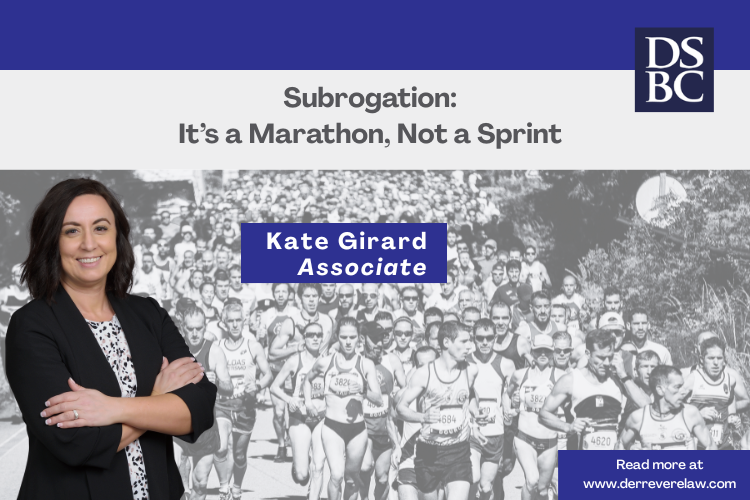Leveraging Prejudgment Interest to Maximize Recoveries in Subrogation Claims

Interest rates – they’re all the rage! Whether you’ve recently purchased a new vehicle, are considering home ownership, or have simply tuned into the nightly news lately, you’ve probably heard plenty on the topic of interest rates. But what if I told you those rates are more than fodder for headlines when it comes to your subrogation claim? In fact, in the world of subrogation, those rates could be the secret ingredient to boosting your recovery strategy.
What is Prejudgment Interest?
At its core, prejudgment interest functions as a tool to compensate a party for the loss of use of money due to a delay in receiving payment owed. In the context of subrogation, when an insurance company steps into the shoes of its insured to recover damages from a third party, the insurer is generally entitled to collect not only the base amount of the claim, but also the interest that would have accrued from the time of loss up until the final judgment or settlement.
With this in mind, there are two chief purposes of prejudgment interest:
- Compensation for Delay: It acknowledges the fact that the claimant has been deprived of the use of their funds during the oft-lengthy litigation process.
- Encouragement for Swift Resolution: It creates a financial incentive for the at-fault party to resolve the matter sooner, avoiding an accumulation of additional financial liability as the case progresses to and through litigation.
Jurisdictional Distinctions
It’s important to remember that prejudgment interest is not a one-size-fits-all concept. Each jurisdiction will have a statutory scheme or governing caselaw that prescribes when and how prejudgment interest can be applied, as well as how much interest may be awarded. These variations can have a significant impact on the overall recovery amount in a subrogation claim.
- Interest Rates: Different states impose different rates of prejudgment interest, which may fluctuate in tandem with state and/or federal rates. Some states, like Florida, calculate prejudgment interest based on a statutory formula tied to prevailing interest rates.
- Trigger Dates: The point at which prejudgment interest begins to accrue also varies by jurisdiction. In some states, it begins on the date of the loss, while others start counting from the date a demand is made, or, in technical terms, the date in which the claim becomes “liquidated”.
- Applicability: While some states allow for prejudgment interest as a matter of course in certain types of claims (such as liquidated or contract-based claims), other jurisdictions may limit its application to specific cases or cap the amount of interest that can be awarded. In other instances, prejudgment interest may be discretionary, meaning a judge has the authority to decide whether to award it at all, and if so, how much.
These jurisdictional differences highlight the importance of knowing local rules and adapting recovery strategies accordingly. For law firms engaged in nationwide subrogation work, it’s crucial to stay informed about how prejudgment interest works in each state and how to use it effectively to maximize your clients’ recoveries.
Prejudgment Interest in Florida Subrogation Claims
When turning our attention to Florida-specific claims, Florida has a well-defined legal framework for awarding prejudgment interest. Under Florida law, prejudgment interest is not considered punitive; rather, it is viewed as part of the compensation due to a claimant for the lost time value of money.
In the context of subrogation, this can mean that once the insurer has paid the claim on behalf of the insured, it could potentially begin calculating prejudgment interest from the date of the insured’s loss, provided that the damages are readily ascertainable. This can be particularly beneficial in cases involving significant delays in resolution, as one could argue that interest continues accruing throughout the negotiation or litigation process, substantially increasing the recovery amount.
The interest rate in Florida is set by statute and adjusted quarterly by the Chief Financial Officer of the State. Currently, the rate fluctuates in response to market conditions. In just the past couple of years, Florida has seen its judgment interest rate more than double – from 4.75% in October 2022, to 8.54% in October 2023, climbing all the way up to 9.50% in October 2024, and creeping ever-so-slightly down to 9.15% as of April 1, 2025. This near-constant fluctuation makes it especially critical for Florida subrogation attorneys to stay updated on the latest statutory rates in order to maximize their clients’ potential recoveries.
When is Prejudgment Interest Appropriate?
Understanding the distinction between liquidated and unliquidated claims is often key to determining when it is appropriate to seek prejudgment interest. In practice, most property subrogation claims involve losses with ascertainable, documented amounts, such as repair costs, indemnity payments, or replacement values, making many such claims prime candidates for prejudgment interest awards.
However, if the damages are unliquidated – meaning the amount of the loss cannot be calculated or readily ascertained as a specific amount without additional supporting evidence – entitlement to prejudgment interest becomes a bit trickier. Generally, this legal grey area presents itself most often in cases involving complex liability issues or situations where the extent of damage is in dispute, to highlight just a few examples. These more complicated circumstances require a skilled legal team that can diligently compile and present evidence in a manner which ensures the claim qualifies as liquidated, thereby triggering the client’s potential entitlement to prejudgment interest on the claim.
By understanding how and when to properly seek prejudgment interest, our firm has been successful in leveraging this tool to increase total recovery amounts on behalf of our clients. It can often mean the difference between settling for a fraction of the amount of benefits paid and obtaining a settlement that actually reflects the time and value of readily available money lost while awaiting resolution.
Conclusion: A Valuable Strategy for Optimal Outcomes
If you are considering subrogation counsel, make no mistake – prejudgment interest should not only be a part of their toolkit, it should be one of their favorite tools! Whether prejudgment interest is used as a tool for negotiation or a way to compensate for the delays inherent in the litigation process, its value in maximizing recoveries cannot be overstated. The proper utilization of prejudgment interest can strengthen a subrogation claim and act as a catalyst, helping to turn slow-moving settlement negotiations into more sizeable recoveries. As our firm continues to engage in subrogation recovery efforts nationwide, we remain committed to using all available legal tools to maximize recoveries on behalf of our clients.
If you are interested in learning more and enhancing your toolkit, especially as it relates to prejudgment interest and maximizing recoveries in various states, our experienced legal team here at Derrevere Stevens Black & Cozad is well-equipped and available to answer your questions.




